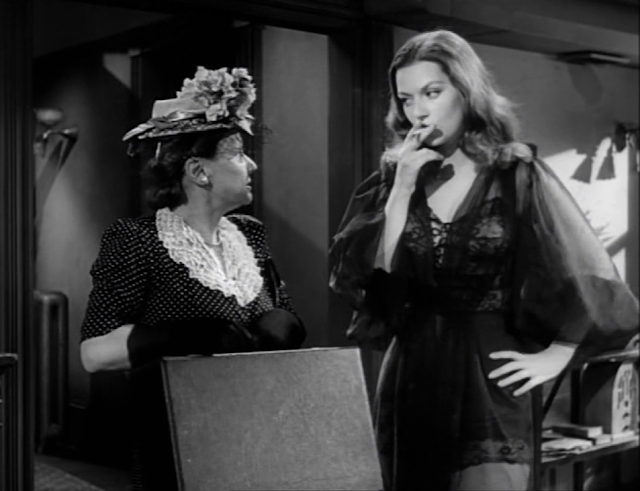
Wealthy Manhattan socialite Alison Courtland (Claudette Colbert) wakes on a train with no recollection of how she got there. This isn’t the first such episode for Mrs. Courtland, or so says her husband Richard (Don Ameche). Luckily for Alison Courtland, a chance encounter with Bruce Elcott (Robert Cummings) sets the amateur detective and his “brother” Jimmie Lin (Keye Luke) on the case. It isn’t long before the heroes discover that Richard isn’t working alone to off his wife so he can marry the mysterious Daphne (Hazel Brooks).
Sleep, My Love (1948) was produced by Mary Pickford, directed by Douglas Sirk, and written by Leo Rosten who also penned the novel on which the film is based. Sleep, My Love was a modest production that rarely exhibits the stylistic tropes of Sirk’s later films. There are plenty of nods towards German Expressionism in those scenes where Alison Courtland is drugged or hypnotized at night, but the overall technique of the film is workman-like.
Unlike most thrillers of the late forties that adhere to some semblance of film noir, Sleep, My Love is far more lyrical in its romanticism. The focus of Rosten’s script is on the romance between Alison Courtland and Bruce Elcott which motivates the latter to protect the former from her husband. In this way the audience is asked to invest more in the love triangle plot than in the Gothic mystery which basically functions as a means for Alison Courtland to change husbands. In this dramatic complex Alison Courtland is deprived of any sort of agency, forced to function as either a victim or a damsel in distress.
In total juxtaposition to the character of Alison Courtland is Daphne. Like many a femme fatale Daphne is the one pulling the strings behind the scene. She’s an entertaining character and Brooks is breathtaking in the role even though Daphne is hardly developed. In her few brief scenes she’s typically lounging about in lingerie complaining and giving orders. Her dominance over her male henchman is all good fun though it feels contrived and cliche.
Sirk’s direction far out classes the writing in Sleep, My Love. The director gets solid performances from every player and manages to add a visual flourish here and there. However, in terms of Sirk’s career, what’s really interesting about Sleep, My Love is the respect he shows Chinese characters and customs. This interest in and respect for East Asian culture presages his creative approach to potentially problematic material in his later film Battle Hymn (1957).
Of the two thrillers that Sirk made starring Claudette Colbert I much prefer Thunder On The Hill (1951) to Sleep, My Love. Not only do the women characters have more individual agency and autonomy in the latter film made for Universal, but Sirk is able to do more visually. Thunder On The Hill has an eerie beauty full of foggy landscapes and spiraling corridors whereas Sleep, My Love feels very theatrical and stagnant. Which isn’t to say that Sleep, My Love is a bad film, it’s simply not conducive to the director doing his best work.
